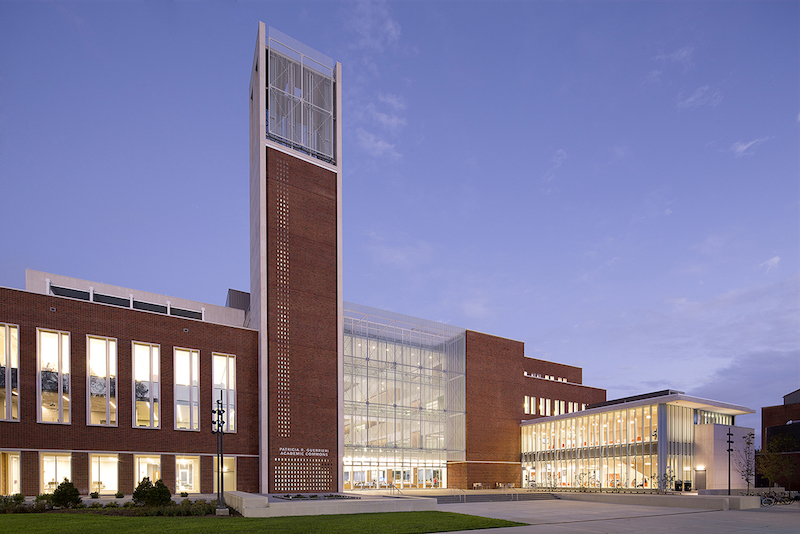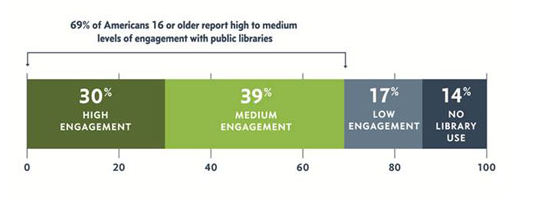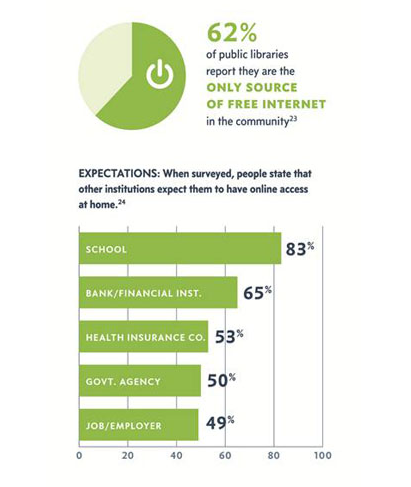Public libraries will avoid being relegated to the scrap heap of history in a digital age as long as they continue to serve as platforms for learning, creativity, and innovation that strengthen their communities.
That’s the conclusion of a new report “Rising to the Challenge: Re-envisioning Public Libraries,” which the Aspen Institute has produced in partnership with the Bill and Melinda Gates Foundation.
There are nearly 9,000 public library systems and 17,000 branches and outlets across the U.S. Nearly seven in 10 Americans say they have at least “medium” levels of engagement with their public libraries. And nearly a quarter of U.S. adults use their local libraries for Internet access.
“The public library is a key partner in sustaining the educational, economic and civic health of the community during a time of dramatic change, [and] there is already a significant physical presence and infrastructure to leverage for long-term success,” the report states.
As important, the library "is a core civil society institution, democracy’s 'maker space,'" the report asserts.
But as public libraries shift from being repositories for materials to platforms for learning and participation, their ability to provide access to vast amounts of content in all formats will be vital. “Libraries face two immediate major challenges in providing access to content in all forms,” the report says. “Being able to procure and share e-books and other digital content on the same basis as physical versions, and having affordable, universal broadband technologies that deliver and help create content.”
A 21st-century library will remain relevant only if it is built on three key assets: people, place, and platform. The report observes that libraries are “shifting from building collections to building human capital, relationships, and knowledge networks in the community.”
While a library is both a physical and virtual place, the report believes its physical presence “anchors it most firmly in the community.” But the library as a learning center is also becoming more of a destination, “a way station on the learning journey.” In that capacity the library in a digital age should also be “a virtual space accessible from anywhere 24/7.”
A library’s goal, says the report, should be to enable individuals and communities “to create their own learning and knowledge.” So a library “platform” needs to be adaptable to the individual’s needs. “The library as platform radically reshapes [its] daily activities, shifting away from the old model of organizing and ‘lending’ the world’s knowledge toward a new vision of the library as a central hub for learning and community connections.”
To be successful in a digital age, libraries, says the report, will require a different kind of access and distribution infrastructure, more sophisticated analytics “that will enable the library itself to become a “learning organization,” and the ability to scale themselves to facilitate innovation and competition.
The report recommends four strategic opportunities for action to guide libraries’ transformation: aligning their service to support community goals, providing access to content in all formats, ensuring the long-term sustainability of public libraries through greater attention to potential financial resources, and cultivating “leadership.”
But library professionals face several leadership challenges, such as taking advantage of digital tools; building the library’s capacity, which might benefit from exploring best practices outside the U.S.; thinking harder about succession planning; including trustee and “friend” groups in leadership development activities; and developing strategies that can keep pace with larger disruptive changes.
Libraries and their communities must also be watchful, and be prepared to respond to, several important developments and trends, including new technologies and their impact on a global information economy, online education, the boundaries of privacy and data protection, and “hyperconnected” societies.
Related Stories
Adaptive Reuse | Oct 22, 2024
Adaptive reuse project transforms 1840s-era mill building into rental housing
A recently opened multifamily property in Lawrence, Mass., is an adaptive reuse of an 1840s-era mill building. Stone Mill Lofts is one of the first all-electric mixed-income multifamily properties in Massachusetts. The all-electric building meets ambitious modern energy codes and stringent National Park Service historic preservation guidelines.
MFPRO+ News | Oct 22, 2024
Project financing tempers robust demand for multifamily housing
AEC Giants with multifamily practices report that the sector has been struggling over the past year, despite the high demand for housing, especially affordable products.
Performing Arts Centers | Oct 21, 2024
The New Jersey Performing Arts Center breaks ground on $336 million redevelopment of its 12-acre campus
In Newark, N.J., the New Jersey Performing Arts Center (NJPAC) has broken grown on the three-year, $336 million redevelopment of its 12-acre campus. The project will provide downtown Newark 350 mixed-income residential units, along with shops, restaurants, outdoor gathering spaces, and an education and community center with professional rehearsal spaces.
Office Buildings | Oct 21, 2024
3 surprises impacting the return to the office
This blog series exploring Gensler's Workplace Survey shows the top three surprises uncovered in the return to the office.
Healthcare Facilities | Oct 18, 2024
7 design lessons for future-proofing academic medical centers
HOK’s Paul Strohm and Scott Rawlings and Indiana University Health’s Jim Mladucky share strategies for planning and designing academic medical centers that remain impactful for generations to come.
Sports and Recreational Facilities | Oct 17, 2024
In the NIL era, colleges and universities are stepping up their sports facilities game
NIL policies have raised expectations among student-athletes about the quality of sports training and performing facilities, in ways that present new opportunities for AEC firms.
Codes and Standards | Oct 17, 2024
Austin, Texas, adopts AI-driven building permit software
After a successful pilot program, Austin has adopted AI-driven building permit software to speed up the building permitting process.
Resiliency | Oct 17, 2024
U.S. is reducing floodplain development in most areas
The perception that the U.S. has not been able to curb development in flood-prone areas is mostly inaccurate, according to new research from climate adaptation experts. A national survey of floodplain development between 2001 and 2019 found that fewer structures were built in floodplains than might be expected if cities were building at random.
Seismic Design | Oct 17, 2024
Calif. governor signs limited extension to hospital seismic retrofit mandate
Some California hospitals will have three additional years to comply with the state’s seismic retrofit mandate, after Gov. Gavin Newsom signed a bill extending the 2030 deadline.
MFPRO+ News | Oct 16, 2024
One-third of young adults say hurricanes like Helene and Milton will impact where they choose to live
Nearly one-third of U.S. residents between 18 and 34 years old say they are reconsidering where they want to move after seeing the damage wrought by Hurricane Helene, according to a Redfin report. About 15% of those over age 35 echoed their younger cohort’s sentiment.



















